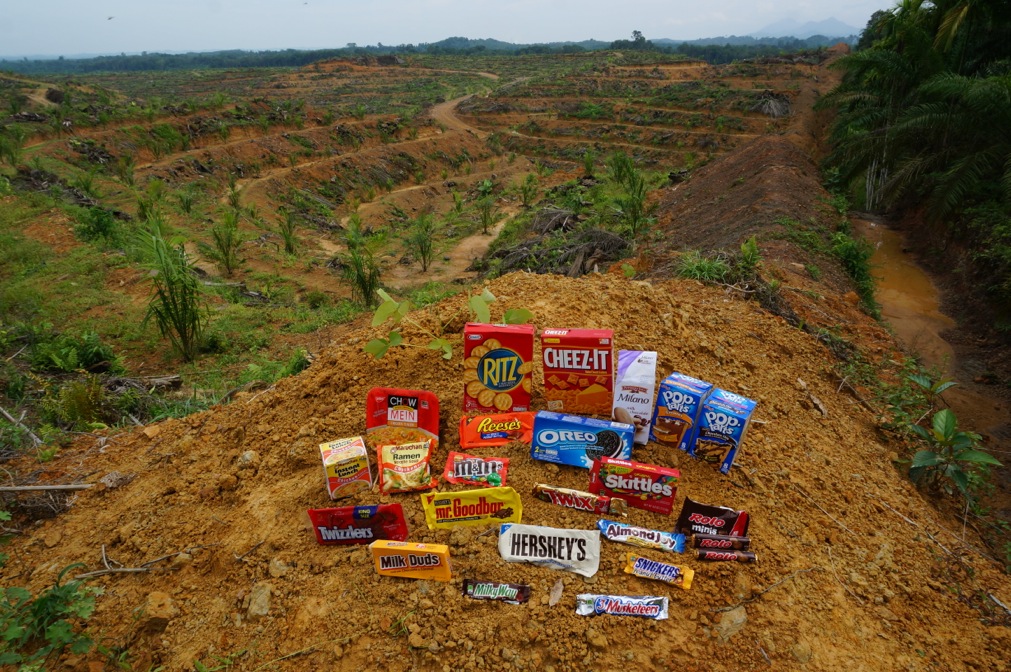When you read the label on the processed foods you buy at the supermarket, what do you look for? I’ve mostly been on the hunt for information about calories, sugar and fat content, transfats, and synthetic chemicals like food dyes and preservatives. Rainforest Action Network (RAN), along with Dr. Andrew Weil, an expert in integrative 
According to Dr. Weil, “Fresh palm fruit oil, sometimes called ‘red palm oil,’ is a nutritious and beneficial oil. However, it’s important not to confuse this raw oil with palm kernel oil, or the highly processed versions of crude palm oil that are commonly used as ingredients in the industrially produced packaged foods found in most Americans’ diets. These types of palm oil are unhealthy for the human body. And their irresponsible cultivation in tropical areas is unhealthy for the planet.”
Dr. Weil joins a chorus of voices expressing concern that, when it comes to replacing trans fats, we may be jumping out of the frying pan and into the deep fryer. The World Health Organization, the National Heart, Lung and Blood Institute, the National Institute of Diabetes and Digestive and Kidney Diseases, and the USDA’s Agricultural Research Service all recommend against consuming palm oil and other tropical oils because their saturated fat content is so high.
Beyond the health issue, environmentalists and human rights activists are concerned that the FDA ban on trans fats will lead to a repeat of the mistakes companies made ten years ago when the FDA mandated trans fat labeling. That mandate led to a 500% increase in demand for Conflict Palm Oil, which is produced in ways that cause large scale rainforest destruction and human rights abuses.
In fact, palm oil can now be found in roughly half the packaged food products sold in grocery stores. It is added to teething biscuits, baby formula, granola bars, peanut butter, crackers, and more. When we feed our kids food that comes out of a bag, a box, or a package of any kind, chances are they’re eating palm oil.

That’s why I’m so passionate about our Conflict Palm Oil campaign to pressure the Snack Food 20* group of companies to eliminate Conflict Palm Oil from their products. And I’m pleased to report that it is working. A few months ago, palm oil mega-giant Wilmar International – which controls 45% of the global trade in palm oil – adopted a conflict-free palm oil policy. On Valentine’s Day, Kellogg released a strengthened palm oil purchasing commitment, joining industry peers Nestle, Unilever and Ferrero. But we’re still waiting for several other kids’ snack makers to step up to the plate, including Kraft, PepsiCo, Heinz, Campbell Soup, ConAgra Food and Cargill.
What can moms do to make a difference?
1) Keep reading labels. Palm Oil goes by many names, including Palm Kernel Oil, Palmitate and Glyceryl Stearate. You’ll be amazed how ubiquitous it is, once you learn to recognize its many names.
2) Read RAN’s Conflict Palm Oil report, which outlines the health, human and environmental impacts of this destructive product and lays out exactly what we are asking shoppers and companies to do to eliminate it.
3) Take action online to tell the Snack Food 20: Don’t replace trans fats with Conflict Palm Oil.
Thanks to the support of RAN activists and allies, we are making progress and gaining traction. But we’ll need to keep pushing to reach the tipping point. I am convinced that moms have the power to provide the added momentum we’ll need to remove Conflict Palm Oil from our food supply.
* “Snack Food 20” group of companies are Campbell Soup Company; ConAgra Foods, Inc.; Dunkin’ Brands Group, Inc.; General Mills, Inc.; Grupo Bimbo; Hillshire Brands Company; H.J. Heinz Company; Hormel Foods Corporation; Kellogg Company; Kraft Food Group, Inc.; Krispy Kreme Doughnuts Corp.; Mars Inc.; Mondelez International, Inc.; Nestle. S.A.; Nissin Foods Holdings Co., Ltd.; PepsiCo, Inc.; The Hershey Company; The J.M. Smucker Company; Toyo Suisan Kaisha, Ltd.; and Unilever.
NOTE: Thanks to RAN for sponsoring this post. Sponsors allow us to provide expert content at no cost to you. Our editorial opinions remain our own.












